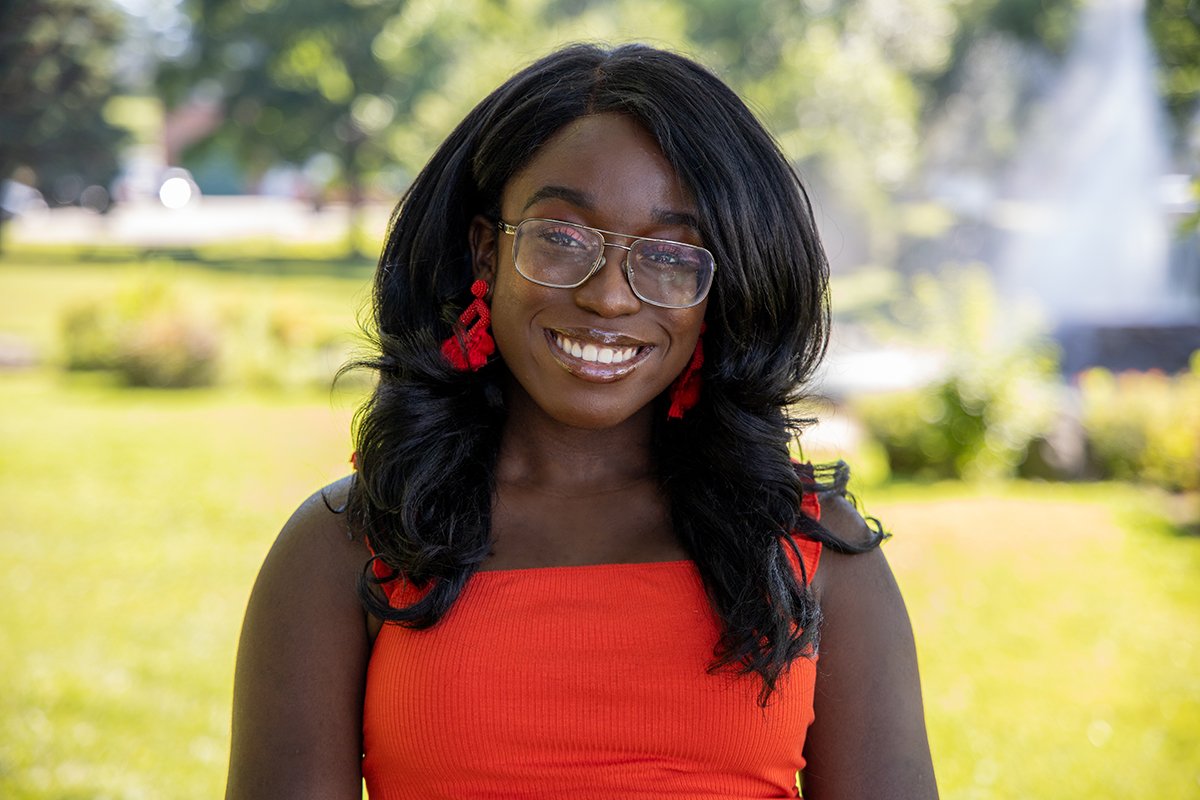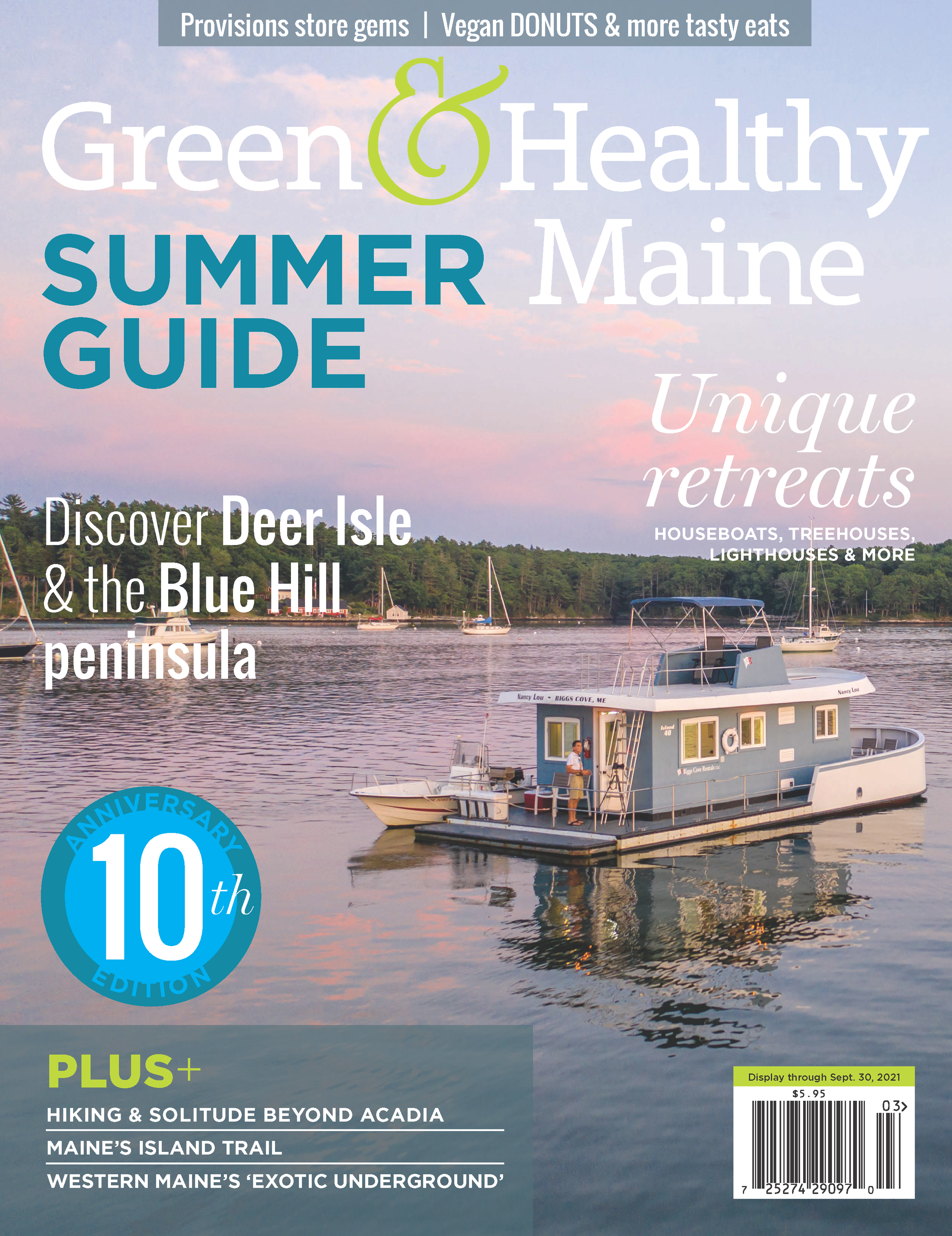Interview with a Changemaker: Amara Ifeji
At 19, Amara Ifeji of Bangor is already one of Maine’s best known environmental activists. Photo: Phoebe Parker.
By Amy Paradysz
Amara Ifeji of Bangor has been selected by National Geographic as one of 24 Young Explorers from around the world who are tackling the most complex and urgent issues of our time. While she was at Bangor High School, she received multiple awards for her research projects on methods of water purification. These days, the 19-year-old leans more toward activism. While studying politics, philosophy and economics with a concentration in energy and environmental policy at Northeastern University, Ifeji works as the Grassroots Development Coordinator for Maine Environmental Education Association.
Green & Healthy Maine writer Amy Paradysz interviewed Ifeji the week she moved back to Bangor for the summer. The following are highlights from the interview.
Not many 19-year-olds are pushing so hard in so many directions. What motivates you?
My family, particularly my grandparents. My grandfather just had his 83rd birthday, and we had a little get-together now that many of us are vaccinated. I got so emotional and expressed to him that all that I do is for him and my grandmother. They sacrificed a lot in coming to the United States, and I want to make sure that everything they left in Nigeria was not in vain and that I will take hold of all the opportunities the United States has to offer when it comes to exploring my passion.
You’re already employed as an environmental educator?
Yes. When I was 16, I was able to attend the Maine Environmental Changemakers Gathering. That was a profound experience in my life. Up until that point, although I had been focused on climate justice and climate justice advocacy, I was focused on doing so from a scientific lens. I collected data and did research and was the leader of Bangor High School’s water management team.
But when I attended the Changemakers Gathering, which is hosted by the Maine Environmental Education Association, I was able to look at the issue of the climate crisis from a social lens and how the science directly impacts—negatively impacts—communities that have historically faced inequities.
At 17, I was part of the youth planning team for the Gathering. At 18, I was afforded a fellowship. And then just last August, I became a staff member.
How do you fit that in with being a full-time student?
I’d wake up around 6:45 a.m. and was pre-registered for a gym slot from 7 to 7:50 a.m., then have a straight shot of classes from 8 to 11:30 a.m., and then I’d have virtual meetings from 11:30 until 5 p.m. or so, working with youth, staff and fellows on projects and programs. Then after that, sometimes I’d have a panel discussion until 6 or 7, then I would run and do my homework until about 11. I used to be the kind of person who would pull an all-nighter if it didn’t get done. But now, if it doesn’t get done, it doesn’t get done. Because, if I can’t show up for myself and my wellbeing, I can’t show up for my community.
And you’re the youngest person on the Maine Climate Council Equity Subcommittee, too?
Yes, our subcommittee is tasked with ensuring that any legislative action that comes out of the Maine Climate Action Plan, which was passed by the Maine Climate Council in December 2020, does not further disproportionately impact communities of color and other communities that have taken the brunt of the climate crisis.
I’ve heard that Maine—particularly Acadia National Park— inspired your initial interest in the environment.
Yes. I was 9, and I remember my family driving up Cadillac Mountain and seeing that huge expanse of trees. It was something that I’d never seen before, growing up in Maryland before then. It was a profound experience
Amara Ifeji and the members of her former Stormwater Management and Research Team (SMART) research group from Bangor High School on Phillips Lake. Courtesy photo.
What are your other favorite Maine places?
I love Chick Hill in Clifton, right outside of Brewer. It’s a beautiful place to hike. In the fall, with the foliage, it kind of looks like a Bob Ross painting.
You enjoy hiking?
I want to get really dangerous with hiking. Maybe do Katahdin one day. But I’m starting with baby hills and will progress from there.
What else do you enjoy outdoors?
Although I advocate for folks to get outside, it’s taken me a lot of persistence to have these outdoor experiences myself. Last summer when I went to Lake St. George in Waldo County with my friends, I saw five Confederate flags and, instantly, I felt like this wasn’t a place for me. It should be, and I’m working to the point that I spend more time outdoors.
I want to go camping. I’ve learned that in Maine there’s a distinction between camps and camping, and I’ve not gone camping.
Do you enjoy swimming?
I cannot swim, but I have folks who are committed to teaching me this summer. I’m really excited about that, because, I mean, I live in Maine!
Well, I can’t ride a bike. So now you can feel better.
You can’t? I learned to ride a bike when I was 10.
You’ve still got me beat. And I’ve definitely never been interviewed by Jane Fonda, which I know was part of your busy-ness this past week.
My grandparents had never heard me interviewed before, so I cued up the Jane Fonda interview while I was visiting, and they were like, “Wow, you’re on TV!”
Internet. TV. Close enough. I remember Jane Fonda’s workouts. But she’s quite the environmental activist!
She started her show, “Fire Drill Friday,” to bring attention to the climate crisis. She talks with systems thinkers and changemakers about their advocacy efforts and what they think we can do to bring about a more just and sustainable future.
What do you tell people who think the climate crises is too big or too complex an issue for them to make a difference?
Start local and implement sustainable practices into your day-to-day life. Those collective efforts have the power to make change. It’s so much easier than you might think to get involved and impact environmental change.
Would you say that you’re a systems thinker? Is that why you have such an eclectic program of study?
Yes, I’m really interested in an intersectional approach. I want to be better able to approach pressing issues with a diversity of perspectives. When it comes to the climate crisis and advocating for environmental rights, I know that it’s directly impacting people’s lives and their livelihoods. I want to be part of the systems changes and the solutions to make sure these issues are addressed.
Your family must be so proud of all your achievements.
When I was little, my mother called me her “little cardiovascular surgeon.” I think there were hopes that I would go into medicine. But now they see what I’m doing and they’re excited for me and wholeheartedly support me.
What are you up to this summer?
The National Geographic Explorers Festival is in June. That’s another opportunity to connect with other Young Explorers and all the individuals funded by National Geographic. I’m working full time, taking summer classes remotely and getting outdoors. And I’m excited for a family reunion. I’ll be spending time with the folks who I love and doing the work that I love.
What could be more “American dream” than that?
Honestly, I can’t think of anything else!




